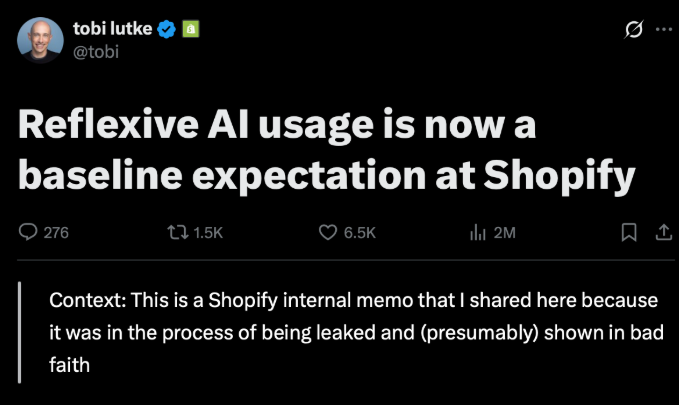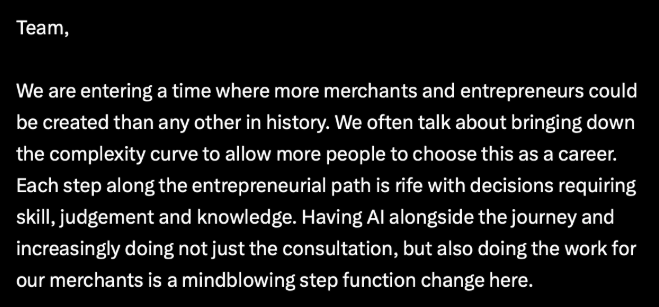Has the CEO of Shopify created a new working class?
- Dolores Abuin
- Jul 11, 2025
- 5 min read
On April 7, 2025, Tobi Lütke, CEO of Shopify, shared an internal memo that was soon leaked on X (formerly Twitter). At first glance, it seemed like just another piece of corporate communication. But given the stir it has caused, we may be witnessing something much deeper. Perhaps we are seeing the beginning of a new workforce structure.
In our Group 2.1 “Future Professions: New Opportunities and Requirements” from OdiseIA–Google.org, we analyze how the integration of AI is becoming the foundation of emerging job profiles and the key skills that will make a difference in the increasingly near future.

We still don't know if this document will earn a place alongside Taylor, Ford, or Toyota in the history of the workplace. But what it proposes could mark a turning point in our understanding of the future of employment.
The impact of AI on the future of work is precisely the central focus of our group 2.1, "Future Professions: New Opportunities and Requirements," organized by OdiseIA as part of the Google cAIre project and led by Ricardo Palomo (Coordinator), Dolores Abuin, Jorge Cerqueiro, Frank Escandell, and José Javier Sesma.
Behind what appear to be internal guidelines, Lütke's text suggests a radical transformation—the potential emergence of a new social contract for labor.

Key aspects of this new contract
Greater individual autonomy
Economic success and innovation as primary values
Social norms shaped by online networks and influencers
A diminished role for unions and regulators
And a new criterion for belonging: AI Artificial Intelligence becomes a criterion for either belonging to or being excluded from the labor world.
The birth of “Tobism”?
It may be too early to call it that, but the memo reads as a manifesto in tone, structure, and consequences. And like any manifesto, it proposes a worldview. This one, in particular, redefines what it means to be useful in the age of AI, and with it, gives rise to a new professional class: the augmented workforce.
Tobi publicly put in writing what many other companies may not yet dare to say. He outlined a new professional identity: autonomous, AI-driven, focused on performance and constant self-learning.
This isn't just a trend. Shopify isn't an exception. Klarna, for instance, has already laid off hundreds of employees after implementing AI systems. Other companies may be watching. Some may already be copying.
What Is the Tobi Manifesto?
A manifesto is a declaration of intent, an ideological road map. It’s not a set of random ideas. Lütke's document checks all the boxes. It imposes principles, redefines competencies, and transforms the logic of work.
“These aren’t just aspirational phrases — they’re fundamental expectations.”
What Is the Augmented Working Class?
This is the class that automatically uses AI. It doesn’t just involve effort—it generates exponential impact. It learns independently, shares knowledge, and constantly improves. If it stagnates, it falls behind.
“Stagnation is almost certain, and stagnation is slow-motion failure.” “If you're not climbing, you're sliding.” Traditional vs. Augmented Workers (according to Shopify)
Traditional Workforce | AI-Augmented Workforce |
Uses tech tools | Uses AI automatically, habitually, unconsciously |
Learns when needed | Learns constantly, self-directed |
Works within traditional structures | Redesigns processes through AI logic |
Relies on experience and/or intuition | Shares knowledge, no hierarchies |
Foundations of Tobism
The manifesto reflects a profound cultural shift. Adapting to new environments is no longer enough—it’s mandatory. A new learning curve emerges, one that rewards the ability to "multiply" results through AI.
"These aren’t just aspirational phrases—they’re fundamental expectations." Learning and adapting are no longer virtues; they are non-negotiable expectations. Tobi’s proposal goes far beyond reskilling or upskilling. It redefines what it means to be a competent professional today in a leading company. Now, competence is measured by one’s ability to learn autonomously, share insights as a key driver of team improvement, and optimize workflows collectively.
The Six Principles of the New Labor Order

Effective Use of AI as a Core Expectation “Using AI effectively is now a fundamental expectation of everyone at Shopify.” AI is no longer optional. It’s a basic job requirement. Those who don’t know how to use it simply don’t belong. Applying AI effectively is a shared and ongoing obligation.

AI as the Basis of Prototyping “AI must be part of your GSD Prototype phase.” Prototypes must be built with AI from the start. Human input comes only if AI is not sufficient.

Performance Reviews Will Include AI Usage “We will add AI usage questions to our performance and peer review questionnaire.” AI will be part of how professionals are evaluated. It’s not enough to use it—you must show how it improves your work.

Self-Directed Learning and Shared Culture “Learning is self directed, but share what you learned.” Professionals must learn independently, but sharing that knowledge is part of the job. Slack, Vault, Copilot, and Cursor foster collective learning.

Justifying the Use of Human Resources “Before requesting additional headcount and resources, teams must demonstrate why they cannot achieve their objectives using AI.” Before requesting staff or resources, teams must prove that AI alone isn’t enough. The order has reversed: AI first, humans second.

Cross-Hierarchical Culture Without Tech Privilege “Everyone means everyone. This applies to all of us—including me and the executive team.” Everyone—including the CEO—is expected to share learnings, mistakes, and tools. Collective learning is now mandatory.
What tools does Shopify provide?
Copilot
Cursor
Claude
Code
Proxy
Slack (#revenue-ai-use-cases, #ai-centaurs)
Vault (shared knowledge repository)
“You don't just get a front-row seat, but are surrounded by a whole company learning and pushing things forward together.”
Vulnerability is now algorithmic?
This is where Tobism becomes harsh. AI doesn’t punish—it silently replaces you. Those who can’t self-learn, automate, effectively prompt AI, or scale will be left behind. No firing, no formal goodbye. You simply vanish from the new professional class. Vulnerability no longer depends on age, gender, or education, but on your ability to adapt to algorithmic logic. If you’re not in, you’re out.
Are We Entering a Culture With No Room to Disagree? Can mandatory AI usage become a form of exclusion? Are we creating a hyper-adapted elite and a leftover class? What happens to human judgment when AI-driven productivity becomes the only metric? And what if I don’t want to use AI?

Where does humanity stand?
We’re told that AI won’t replace us—it will make us better. Maybe that’s true. But many jobs will disappear, while others—still unimaginable—will emerge. The question is not just what will happen, but when… and how.
In this era where AI turns us into "augmented humans," we must ask ourselves: What role do we want to play? Do we really want to be faster, more efficient—more machine than human? Should our value be measured by how much we resemble an algorithm?
Can we talk about ethics without talking about limits? What do Shopify’s employees really think? And those at companies that begin to follow suit? Is there room to disagree, to offer a different vision?
Epilogue
The Tobi Manifesto is not just a corporate memo. It might become the first clear formulation of a new algorithmic labor pact. It could be a foundational text of a new professional contract. For the moment, only time will tell.
Maybe we’ll forget it in a few months.
Or maybe, without even realizing it, we’re already living inside it.
The real question isn’t whether it will happen. It’s whether we’ll accept it—without questioning, without debating, without noticing.
The greatest risk may not be that AI replaces us, but that it convinces us that being human… is no longer enough.
OdiseIA, Spanish acronym for the Observatory for the Societal and Ethical Impact of Artificial Intelligence, encourages and supports reflection on the extensive use of AI.





Comments